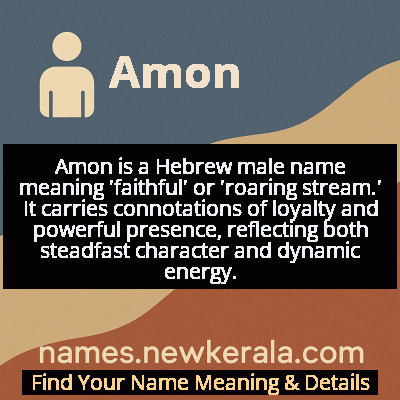Amon Name Meaning & Details
Origin, Popularity, Numerology Analysis & Name Meaning of Amon
Discover the origin, meaning, and cultural significance of the name AMON. Delve into its historical roots and explore the lasting impact it has had on communities and traditions.
Name
Amon
Gender
Male
Origin
Hebrew
Lucky Number
7
Meaning of the Name - Amon
Amon is a Hebrew male name meaning 'faithful' or 'roaring stream.' It carries connotations of loyalty and powerful presence, reflecting both steadfast character and dynamic energy.
Amon - Complete Numerology Analysis
Your Numerology Number
Based on Pythagorean Numerology System
Ruling Planet
Neptune (Ketu)
Positive Nature
Intuitive, analytical, spiritual, and inquisitive.
Negative Traits
Secretive, reserved, aloof, and can be overly critical.
Lucky Colours
Green, yellow.
Lucky Days
Monday.
Lucky Stones
Cat’s eye, moonstone.
Harmony Numbers
1, 5, 6.
Best Suited Professions
Scientists, researchers, spiritual leaders, detectives.
What People Like About You
Depth of knowledge, analytical skills, spirituality.
Famous People Named Amon
Amon of Judah
Biblical King
King of Judah who reigned for two years before being assassinated by his servants
Amon Göth
Nazi Officer
SS commandant of Kraków-Płaszów concentration camp during World War II
Amon Tobin
Musician/Producer
Brazilian electronic musician known for his innovative sound design and complex rhythms
Amon Liner
Artist
American painter and sculptor associated with the Southern folk art tradition
Name Variations & International Equivalents
Click on blue names to explore their detailed meanings. Gray names with will be available soon.
Cultural & Historical Significance
In ancient Egyptian mythology, Amon (often spelled Amun) was one of the most important deities, the king of gods during the New Kingdom period. As part of the Theban triad with Mut and Khonsu, Amun evolved from a local deity to a national god, eventually merging with Ra to become Amun-Ra, the supreme creator god. This dual heritage gives the name profound religious and historical weight across both Semitic and North African cultures.
The name's journey through history reflects the interconnectedness of ancient civilizations and demonstrates how names can carry multiple layers of cultural meaning. From the royal courts of Judah to the temples of ancient Thebes, Amon has been associated with power, divinity, and complex historical narratives that continue to resonate in modern times.
Extended Personality Analysis
Individuals named Amon are often perceived as possessing strong leadership qualities and deep conviction. The name's meaning of 'faithful' suggests someone who is loyal, dependable, and committed to their principles and relationships. They tend to be determined individuals who stand by their beliefs, sometimes to the point of stubbornness, reflecting the biblical king's complex character.
The 'roaring stream' aspect of the name's meaning implies a powerful, dynamic personality with strong emotional currents. Amons are often seen as passionate, energetic individuals who can be both nurturing and formidable. They may possess a natural authority and the ability to influence others, combined with a depth of character that runs like an underground river—calm on the surface but with powerful undercurrents of emotion and conviction.
These personality traits create a compelling combination of steadfast reliability and intense passion. Amons are typically not superficial individuals; they tend to think deeply about life's important questions and approach relationships with seriousness and commitment. Their strength of character often makes them natural leaders, though they may need to balance their powerful convictions with flexibility and openness to others' perspectives.
Modern Usage & Popularity
In contemporary times, Amon remains a relatively uncommon but distinctive name choice. It has seen modest usage among parents seeking biblical names with strong historical roots but less common than mainstream options like Adam or Aaron. The name maintains a certain exotic appeal due to its Egyptian mythological connections, while its Hebrew origins give it traditional weight. Recent years have seen slight increases in usage, particularly among families interested in ancient history or seeking unique biblical names. It's more popular in European countries like Germany and Austria than in English-speaking nations, where it ranks outside the top 1000 names but maintains a steady presence among those preferring historically significant but uncommon names. The name's association with the villain in 'The Legend of Korra' has given it some modern pop culture recognition among younger generations.
Symbolic & Spiritual Meanings
Symbolically, Amon represents the duality of faithfulness and power. The 'faithful' aspect symbolizes loyalty, reliability, and spiritual commitment—qualities that speak to enduring relationships and steadfast principles. The 'roaring stream' element represents life force, emotional depth, and unstoppable momentum. Together, these meanings create a symbolic portrait of someone who combines deep loyalty with powerful presence. The name also carries connotations of hidden strength and ancient wisdom, reflecting its mythological origins where Amun was considered the 'hidden one'—the unseen force behind all creation. This symbolic richness makes Amon a name that suggests both visible strength and profound inner depth, representing the balance between outward action and inward conviction that characterizes truly influential individuals.

